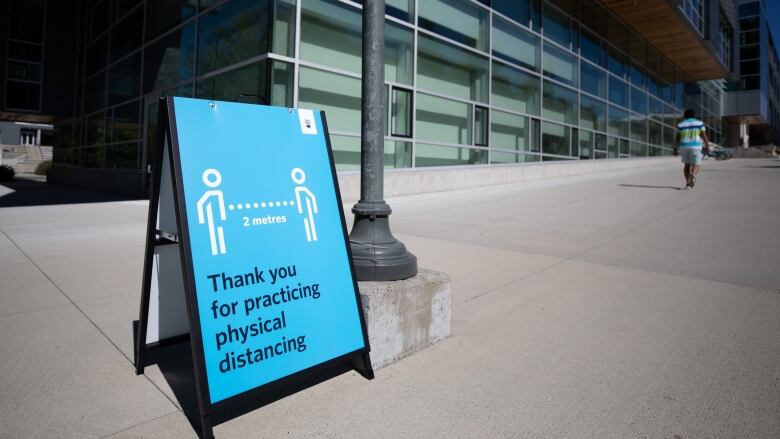Fewer students, more hand sanitizer: Pandemic transforms residences on B.C. campuses
Post-secondary institutions face losses in the millions of dollars while maintaining safety

When Jessica Wei got accepted at the University of British Columbia last spring, she imagined a post-secondary experience that included living in residence with her best friend and eating meals at the cafeteria.
But the pandemic changed all that when most universities and colleges in B.C., including UBC,opted to move the majority of their programs onlinethis fall to mitigate the spread of COVID-19.
Wei no longer felt it was worth the cost to be on campus, so shewill remain at home with her parents in Surrey, B.C.
"I just feel like there's a lot of things socially that I'm missing out on,"Wei said. "I definitely feel like I would be a lot more independent if I was living on my own."
Under normal circumstances, Wei would have been one of thousands of post-secondary students across B.C. moving into residence this weekend. Instead, dorms that are usually in short supply will only house a fraction of their regular residents.
Andrew Parr, UBC's associate vice-presidentof student housing and hospitality services, says only 44per cent of the university's 12,400 beds will be occupied this fall. Most years, there are 6,000 students on the waiting list.
"We're seeing significantly less demand,"Parr said.
Millions in lost revenue
The largest cohort that's avoiding campus this year, Parr says, are first-year students like Wei.
Still, UBC is one of the luckier institutions its large campus, equipped with amenities like a grocery store, movie theatre and community centre, houses many students who call it home year-round.
For other institutions, like the University of Victoria and the University of Northern B.C., occupancy in residence this fall will becloser to one-third of normal.
The shortfall poses a hefty financial burden for universities. For many, housing generates a lot of income. At UBC, Parr says housing revenues have dropped to $66 million from $150 million in a normal year.
But Parr and other universitiessay fewer students in residence means a safer experience overall.

Safety first
Zoe Woods, housing director atSimon Fraser University, says COVID-19 safety measures have reduced capacity in the Burnaby residences toabout 60 per cent of normal this fall. She said there is even a small list of students waiting to get one of the 1,400 residence spots.
"We're doing our best to accommodate the safety of students first, and that takes precedence for us over the possible revenue loss that we're seeing in terms of numbers," Woods said.
For now, Woods says, the university is prioritizing students based on need:athletes in training, those with in-person labs or classes, and students who live on campus year-round.
SFU residents can expect a very different experience from previous years, beginning with move-in day. Students will have to book a time slot for when they can arrive. They will be limited to two helpers, and the university is "strongly encouraging" everyone to wear masks.
Maintaining safety year-roundis also top of mind for universities and colleges as they keep an eye on the U.S., where some campuses have already experienced large outbreaks leading into the fall semester.
Justin Foster,manager of housing and residence life at the University of Northern British Columbia, says staff are working closely with provincial health officials to followguidelines.
Gatherings will be limited, sanitization increased, hand-washing and hand sanitizer stations added, he said.
"We want to create a culture of safety on campus," Foster said.
Need for social connection
University officials say they're trying to balance safety with students' needs for social connection, arguably one of the biggest reasons why many of them choose to live on campus in the first place.
On most campuses this year orientation will still take place, but online. In-person activities for those on campus will consist of small groups and take place outdoors where possible.
But officials like UBC's Parr say they're not anticipating large outbreaks like those at U.S. campuses, mostlybecause classes will be online. But also because universities and colleges in B.C. don't have the same type of party atmosphere.
"Culturally, it's different," Parr said.
"We have a culture of students that is more respectful about the realities of COVID and want to do the right thing to protect themselves, protect their peers, protect people that they're around."












_(720p).jpg)


 OFFICIAL HD MUSIC VIDEO.jpg)
.jpg)



























































































